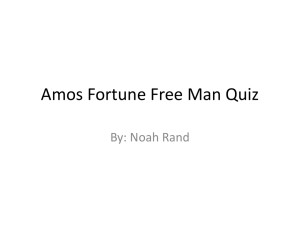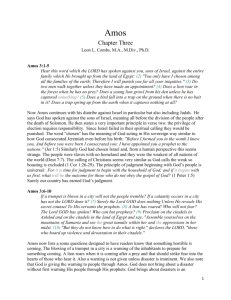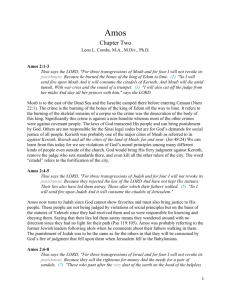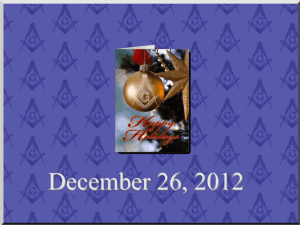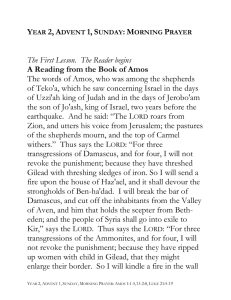An introduction and chapter one of Amos
advertisement
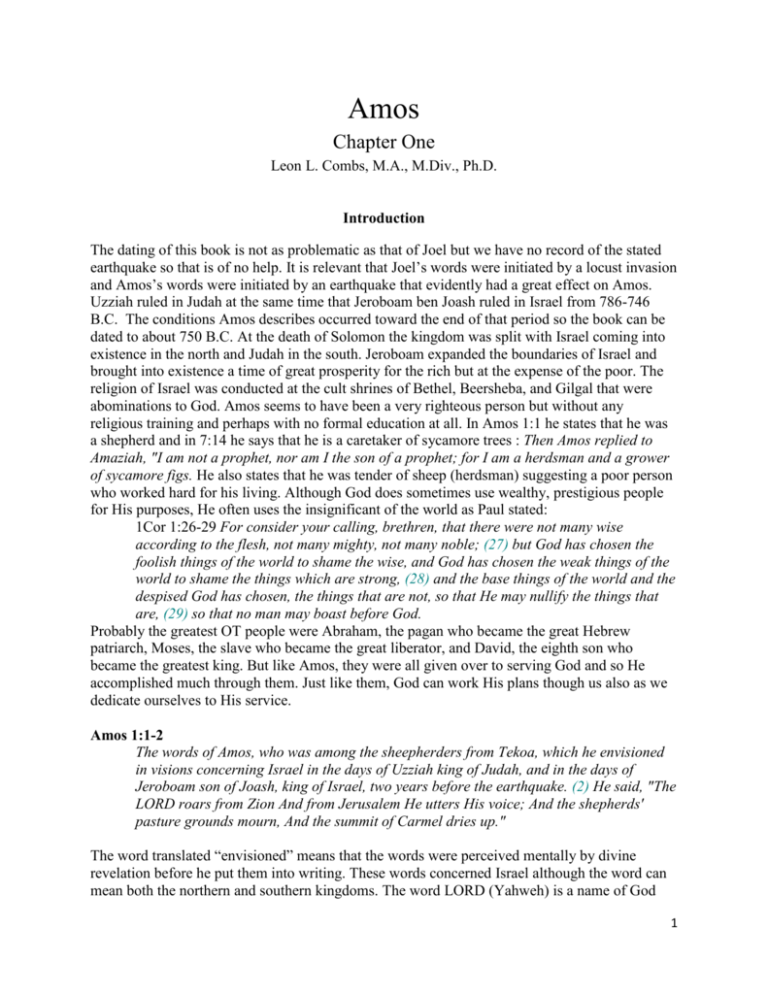
Amos Chapter One Leon L. Combs, M.A., M.Div., Ph.D. Introduction The dating of this book is not as problematic as that of Joel but we have no record of the stated earthquake so that is of no help. It is relevant that Joel’s words were initiated by a locust invasion and Amos’s words were initiated by an earthquake that evidently had a great effect on Amos. Uzziah ruled in Judah at the same time that Jeroboam ben Joash ruled in Israel from 786-746 B.C. The conditions Amos describes occurred toward the end of that period so the book can be dated to about 750 B.C. At the death of Solomon the kingdom was split with Israel coming into existence in the north and Judah in the south. Jeroboam expanded the boundaries of Israel and brought into existence a time of great prosperity for the rich but at the expense of the poor. The religion of Israel was conducted at the cult shrines of Bethel, Beersheba, and Gilgal that were abominations to God. Amos seems to have been a very righteous person but without any religious training and perhaps with no formal education at all. In Amos 1:1 he states that he was a shepherd and in 7:14 he says that he is a caretaker of sycamore trees : Then Amos replied to Amaziah, "I am not a prophet, nor am I the son of a prophet; for I am a herdsman and a grower of sycamore figs. He also states that he was tender of sheep (herdsman) suggesting a poor person who worked hard for his living. Although God does sometimes use wealthy, prestigious people for His purposes, He often uses the insignificant of the world as Paul stated: 1Cor 1:26-29 For consider your calling, brethren, that there were not many wise according to the flesh, not many mighty, not many noble; (27) but God has chosen the foolish things of the world to shame the wise, and God has chosen the weak things of the world to shame the things which are strong, (28) and the base things of the world and the despised God has chosen, the things that are not, so that He may nullify the things that are, (29) so that no man may boast before God. Probably the greatest OT people were Abraham, the pagan who became the great Hebrew patriarch, Moses, the slave who became the great liberator, and David, the eighth son who became the greatest king. But like Amos, they were all given over to serving God and so He accomplished much through them. Just like them, God can work His plans though us also as we dedicate ourselves to His service. Amos 1:1-2 The words of Amos, who was among the sheepherders from Tekoa, which he envisioned in visions concerning Israel in the days of Uzziah king of Judah, and in the days of Jeroboam son of Joash, king of Israel, two years before the earthquake. (2) He said, "The LORD roars from Zion And from Jerusalem He utters His voice; And the shepherds' pasture grounds mourn, And the summit of Carmel dries up." The word translated “envisioned” means that the words were perceived mentally by divine revelation before he put them into writing. These words concerned Israel although the word can mean both the northern and southern kingdoms. The word LORD (Yahweh) is a name of God 1 that reveals His redemptive and covenantal characteristics. Zion is often used as a synonym for Jerusalem. The word is first used in 2 Samuel 5:7 and commonly referred to a specific mountain near Jerusalem (Mount Zion). Amos is then stating that Yahweh roars from Mount Zion and from Jerusalem as He speaks. There is also a result in nature from this expressed voice of God as the pasture earth mourns and the green hills on the summit of Mount Carmel drying up. The result of God speaking from Jerusalem would bring about results in the northern kingdom. Amos 1:3-5 Thus says the LORD, "For three transgressions of Damascus and for four I will not revoke its punishment, Because they threshed Gilead with implements of sharp iron. (4) "So I will send fire upon the house of Hazael And it will consume the citadels of Benhadad. (5) "I will also break the gate bar of Damascus, And cut off the inhabitant from the valley of Aven, And him who holds the scepter, from Beth-eden; So the people of Aram will go exiled to Kir," Says the LORD. We will see this introduction (“For three ….”) in verses 3-5, 6-8, 9-10, 11-12, and 13-15 in this chapter as the Lord addresses these transgressions to Damascus, Gaza, Tyre, Edom, and Ammon. He will repeat this sequence of transgressions in 2:1, 4, 6 as the Lord speaks to Moab, Judah, and Israel. Damascus is representative of all of Syria (Aram) since it was the capital and the center of influence. This method of writing is common to Semitic literature and is used mainly in wisdom literature like Job and Proverbs. Sometimes it is intended to be taken literally and other times it means an indefinite number such as probably intended here since only one crime of Damascus is mentioned. Gilead was a large region east of the Jordan River that was known for its rich forests and the balm produced there and used for healing (Jer 8:22). The incident was an act of inhuman treatment (2 Kings 13:1-9). Hazael ruled Syria in about 841-806 B.C. and he committed monstrous crimes against Israel. Ben-Hadad (Son of Hadad) is actually the name of two or trhree kings of Syria and each of them carried on hostilities against Israel. One of them is the son of Hazael and it may be that here Amos means only this one. The fire represents God’s fierce judgment. The ancient city gates contained massive bars and the breaking of the bar means the city had been entered. The valley of Aven and Beth-Eden are difficult to identify but clearly are somewhere in Syria. Kir is also difficult to identify but Amos considered it to be the origin of the Syrians: "Are you not as the sons of Ethiopia to Me, O sons of Israel?" declares the LORD. "Have I not brought up Israel from the land of Egypt, And the Philistines from Caphtor and the Arameans from Kir? (Amos 9:7) It then seems that Amos is prophesying that they will be sent back to their homeland. Amos 1:6-8 Thus says the LORD, "For three transgressions of Gaza and for four I will not revoke its punishment, Because they deported an entire population To deliver it up to Edom. (7) "So I will send fire upon the wall of Gaza And it will consume her citadels. (8) "I will also cut off the inhabitant from Ashdod, And him who holds the scepter, from Ashkelon; I will even unleash My power upon Ekron, And the remnant of the Philistines will perish," Says the Lord GOD. Similarly we see God only lists one transgression for Gaza as He turns His attention to the Philistines. They lived in five cities in the coastal area and Amos mentions four of them here: 2 Gaza, Ashdod, Ashkelon, and Ekron. They are listed for punishment because of the crime of enslavement that was probably a series of border raids when slaves were sold to the Edomites. God will bring upon them absolute destruction with fire, isolation, and other powers. Amos 1:9-10 Thus says the LORD, "For three transgressions of Tyre and for four I will not revoke its punishment, Because they delivered up an entire population to Edom And did not remember the covenant of brotherhood. (10) "So I will send fire upon the wall of Tyre And it will consume her citadels." The transgression of Tyre is also slavery as they sold an entire population to the Edomites and thus broke the brotherhood covenant. God promised to bring about its destruction and it was later besieged by Nebuchadnezzar and then conquered by Alexander in 332 B.C. Amos 1:11-12 Thus says the LORD, "For three transgressions of Edom and for four I will not revoke its punishment, Because he pursued his brother with the sword, While he stifled his compassion; His anger also tore continually, And he maintained his fury forever. (12) "So I will send fire upon Teman And it will consume the citadels of Bozrah." Edom is another name for Esau, the younger brother of Jacob so the Edomites and Israelites had close family ties that is reflected by the use of the word “brother” as Edom fought against Israel. Teman was the largest city of Edom and Bozrah was a strong fortress city. God prophesied that He would not reserve punishment, but He would send His fire of judgment upon the two cities. Amos 1:13-15 Thus says the LORD, "For three transgressions of the sons of Ammon and for four I will not revoke its punishment, Because they ripped open the pregnant women of Gilead In order to enlarge their borders. (14) "So I will kindle a fire on the wall of Rabbah And it will consume her citadels amid war cries on the day of battle, And a storm on the day of tempest. (15) "Their king will go into exile, He and his princes together," says the LORD. Ammon was northeast of the Dead Sea and the crime against them was another crime against humanity but we do not know the particulars of this specific crime. It may refer to that which occurred toward the end of the ninth century B.C. and mentioned in: Hazael said, "Why does my lord weep?" Then he answered, "Because I know the evil that you will do to the sons of Israel: their strongholds you will set on fire, and their young men you will kill with the sword, and their little ones you will dash in pieces, and their women with child you will rip up." (2 Kings 8:12) Rabbah was the capital of Ammon and it would receive the fiery judgment of God amid some fierce storms. Then the king and his princes would go into exile. The end came to the city finally during the sacking by Nebuchadnezzar as he took large numbers of the people captive. 3
